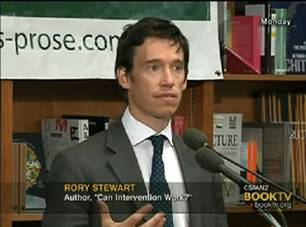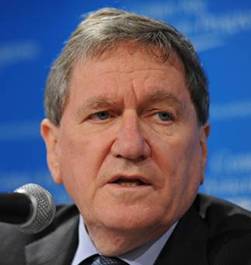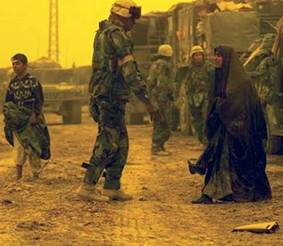Bosnia, Libya, Afghanistan: When Can Intervention Work?

Dear friends of ESI,
These days, in light of the dramatic events in Libya, the merits of humanitarian intervention are once again widely discussed. As the policies of today are compared to those pursued in the 1990s in the Balkans, ESI analysts have taken part in the debate (recently on the websites of the Washington Post, the New Republic, CNN and the New York Times).
Can intervention work? is the title of a new book which has just come out in the US and will be available in Europe in September. The book is part of a series commemorating the 50th anniversary of Amnesty International. Jointly written by Rory Stewart (a member of the British House of Commons and author of The Places in Between) and Gerald Knaus, the book explores many issues long central to ESI's work.
 |
 |
|
Presenting the arguments in Washington D.C. and in Berlin |
|
The book, based on Gerald and Rory's work at Harvard University's Carr Center for Human Rights Policy in 2009/2010, challenges some of the leading assumptions about intervention that have guided policymakers in recent years. It considers the argument that intervention is generally futile; that success is largely a matter of good planning and sufficient resources; and that the key to any success is a strong mandate and extensive international powers together with the determination to stay the course.
In the book Rory takes a close and personal look at the traumatic experience of the current intervention in Afghanistan. Gerald explores conventional wisdoms about the Balkan experience that have later been evoked, from Baghdad to Kabul, as "lessons learned". He also discusses how an approach combining prudence and persistence, what he calls principled incrementalism, has actually transformed the Balkans.
Partially echoing Karl Popper's argument that piecemeal social engineering is always preferable to utopian planning, Gerald argues that the less outsiders know about a foreign society the more easily they fall for illusions of an "hour zero", radical revolutionary change, and view post-conflict societies as a tabula rasa only waiting for smart social engineers to work their magic.
In a recent review the Financial Times wrote that the book offers "timely lessons in when to intervene." These being controversial topics, many of you may find good reasons to disagree with these conclusions. We look forward to hearing from you and will include any reactions and critical debates on our website: www.caninterventionwork.org.
Here you can also find quotes from the book, as well as links to some of the core texts we discuss.
 |
 |
|
The cost of non-intervention in Rwanda and Bosnia |
|
ESI on intervention
The question of intervention has always been central to ESI, from the day in the summer of 1999 in Sarajevo when a group of young "internationals", many then working in the leading institution in the Bosnian protectorate, the Office of the High Representative, decided to set up a new think tank.
Many of ESI's founding members, such as Minna Jarvenpaa, Michael Giffoni, David Stewart Howitt and Marcus Cox, have gone on to work in Kosovo, in the UK Post-conflict Reconstruction Unit, in Afghanistan, and in other parts of the world. Some continued to work in the OHR in Bosnia. Ed Llewellyn, an ESI founding member who left in 2003 after disagreeing with some of our analysis, later became David Cameron's chief of staff.
 |
 |
|
Turning point in the debate: a successful intervention in the Balkans |
|
Some ESI reports have been strongly in favor of intervention: offering an anatomy of international power and the nationalist regimes in Bosnia in 1999, advocating a more assertive international strategy in Bosnia in 2000, making suggestions to the international community to be more proactive in Kosovo. Others have highlighted shortcomings. We have also been critical of liberal imperialism in the Balkans.
In light of current debates, we have pulled together our previous analysis in one place, in the hope that some of it might still be of interest.
 |
 |
|
The cost of reckless intervention? Iraq and Afghanistan |
|
Georgia's choices – an update
Since 2007 ESI has conducted research in the Southern Caucasus, with generous support from the Think Tank Fund of the Open Society Institute. In 2010 we published our findings on the libertarian revolution in Georgia, one of the most extraordinary stories of state building and economic reform in the post-Soviet world. We also presented our research at the Carnegie Endowment in Washington DC at the invitation of Caucasus expert Tom de Waal.
 |
 |
|
Tom de Waal – Ketevan Tsikhelashvili |
|
We are happy to see that our work has since inspired others. Former ESI Georgia analyst Keti Tsikhelashvili has set up her own think tank in Tbilisi to explore these issues further and to foster debate on Georgia's European vocation.
Tom de Waal wrote to us that:
"ESI's study on the Libertarian Revolution in Georgia was an original and ground-breaking report. It inspired me in my own writing on Georgia. I commend ESI's lively and provocative approach to issues, which distinguishes it from most other analysis of the region."
We are happy to return the compliment. In Georgia's Choices: Charting a Future in Uncertain Times, Tom has considerably advanced the debate on the options facing Georgia. He writes:
"After years of governing in an informal and improvisational way, the Georgian government needs to build institutions and choose a long-term development model. Three ideas pull Georgia in different directions."
The first is a conservative conception of "old Georgia." The second envisages Georgia as another "Singapore" continuing its libertarian revolution. The third and last path, offered by the European Union, involves privileged access to the EU's single market in return for institutional reform.
"This path would require the governing elite to surrender both political and economic power … it offers Georgia the best hope of long-term development and a European anchor."
Tom's book offers very interesting insights into a debate that matters not only for Georgia and the EU but for the whole Eastern neighbourhood region. Expect to find more on it on our website.
Many best wishes,

Gerald Knaus
- www.caninterventionwork.org
- ESI on Facebook and Twitter
